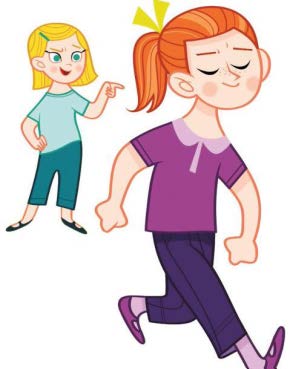October is Bullying Prevention Month as schools and organizations throughout the country are encouraging people to STOMP OUT bullying and cyberbullying. They are hoping to do this through a range of campaigns and events during the month, which aim to change behavior among children and make schools more peaceful places.
Bullying is an enormous issue in US schools, with the Bureau of Justice Statistics and the National Center for Education Statistics Institute of Education Sciences showing that around 28 percent of students between 12 and 18 are bullied in education.
Worryingly, data highlights that, of those who are bullied, just 36 percent report the incidents, suggesting that the overall figures could be significantly higher.
Bullying can cause parents to feel helpless, as many children suffer in silence and do not speak up about their issues. Insults and mistreatment from other students at school can lead to a range of health issues, including depression, eating disorders, insomnia, migraines, anger management problems, and anxiety. All of these conditions can worsen and affect people later on in life, especially if they are not treated quickly.
In particular, The National Institute of Mental Health estimates more than 25 percent of teens have an anxiety disorder, highlighting the stress and pressure faced in modern schools.
The emergence of smartphones and social media also appears to have worsened the problem, with research from Bridgewater State University showing that 9.5 percent of children have been a victim of cyberbullying. Those who owned cell phones were also more likely to be a victim, the findings suggest. Unfortunately, the increased reliance on technology and the internet can result in children turning to the internet for help, rather than parents or teachers.
WHAT ARE CHILDREN TYPING INTO GOOGLE?
When students feel trapped by bullies, there is a chance they will turn to Google for help with their problems. Many youths will feel more threatened if bullies learn they have spoken to others about the issue, while some will feel ashamed about bringing up their situation. These concerns mean the internet may be viewed as their only escape. Research from ProCare and PACER's National Bullying Prevention Center found that searches for the phrase "how to stop bullying" peaked in September and October, reaching a high of 4,400 searches a month. These search volumes coincide with the time of year that many children return to school after summer, indicating that some students may be trying to prepare themselves for potential bullying on their return.
Bailey Lundgren from PACER said: "For many youths and teens, the bullying they are most likely to experience is from peers at school. "Going back to school after summer break is a major transition for students. There are many social changes that occur in the transition back to school, which often requires students to form and renegotiate peer group structures."
Searches for "cyberbullying" also 28 percent of students between 2 and 18 are bullied in scHool,. onlY 36 percent report tHe incidents, increase at the start of Fall, rising to 90,500 in every month of the season. While bullying remains a major problem in American schools, the volume of searches for the term has fallen in the last few years from the peak of more than 200,000 in October 2013. This hopefully suggests that more children are speaking up about the problem. However, with the Pew Research Center finding that 92 percent of teens go online every day, millions of young people are at risk of cyberbullying. Mr. Lundgren wants them to speak to an adult if they are affected by it and try to stay calm.
"Think before you post a comment back to someone who is cyberbullying you. If you're upset, sad, or angry, wait to post or respond. Give yourself some time to cool down, so you don't do something that you can't take back. Retaliation can also get you in trouble," he advised.
Now that Bullying Prevention Month is just around the corner, it is the opportune time to speak to your children about the epidemic, encourage them to take part in initiatives, and play a role in creating a better learning atmosphere.

HOW TO GET YOUR CHILDREN INVOLVED IN BULLYING PREVENTION MONTH
Although Bullying Prevention Month is sure to have a positive impact on schools, it can be difficult for children to open up about the problem. Whether they are being bullied or not, your child may have Instead, start by opening up the lines of communication by asking how their day was, then gradually move towards the subject of Bullying Prevention Month. Perhaps show them the toolkit available through the STOMP OUT Bullying website, which will give them an insight into the different activities available. What's more, you can contact your child's school to find out what their current plans for October are. It may be the case that anti-bullying exercises are already planned.
WHAT IF MY CHILD IS A VICTIM OR A BULLY?
If you are concerned your child is being bullied, try to remain calm and engage in an open conversation, as this will make it easier for students to open up about any issues.
When discussing bullying, it is also crucial that children realize they will not be punished in any way. As a parent, emphasize that they will not have their phone or computer taken away from them. Even if these devices are requested to find out more information, demanding them can send the wrong message and make students more reluctant to speak out in future.
Some children are worried about discussing bullying because the reason for being picked on may be something embarrassing, which they do not want their parents to know. Another reason may be that they do not want their mom and dad to worry, especially if they are already showing signs of stress at home.
If you find out your child is being bullied at school, it is only natural to react instinctively and defensively, leading to responses such as "hit them back". Unfortunately, this can only make the problem worse. However, if you approach the subject in a calm manner, reassure your child that they are not the problem and stay positive, you are more likely to find the information you need to address the problem.
On the other hand, if you are concerned that your child's aggressive behavior suggests he or she is bullying others, speak to them about how insults can affect other people and contact your school to see if their temper is a problem. If it is, there are many techniques that can be used to help them handle their anger. Child psychologists can make a positive difference.
One area where parents can play a positive role for their children is by setting a great behavioral example.
We all have days where we are stressed and it is easy to raise our voice to our children when it isn't necessary. Rather than yell, try to engage in conversations with your kids and give them a platform to talk about what is upsetting them. Even if it is something as minor as a broken toy or video game, encouraging children to speak about their problems and feelings, rather than acting out aggressively, can improve their habits.
Ultimately, bullying is a tragic and complex epidemic that can only be tackled through collaboration between schools, parents, and healthcare professionals. There is no failsafe way to address the problem and children will react differently to the resources available, but help is out there to give children the support they need free themselves from bullying.•
How will bullying prevention month help?
With an overall aim to STOMP Out Bullying, National Bullying Prevention Month has organized a host of events to raise awareness of how the epidemic affects children across the US. These are spread out throughout the months and hope to address some of the behaviors that cause bullying. Here is a rundown of everything that is going on:
World Day of bullying prevention: October 2nd
Monday, October 2nd will see celebrities and communities wear a blue T-shirt to raise awareness of the effects of bullying.
Make friends with someone at school: october 9th
It is easy for students to feel isolated at school, so the organizers of the event have called on students to talk to someone new and make sure they are not left on their own.
Stand up for others week: October 16th
For this week, the organizers have asked for students to stand up against bullies and tell teachers whenever someone is tormented. Other suggested activities include writing positive messages on post-it notes and handing them out to others at school.
WeeK of inclusion: october 23rd
With an overall theme of inclusion, this week calls on students to make sure people are not left on their own. This might mean inviting them to school activities or asking them to sit at their cafeteria table.

Change the Culture: october 30th & 31st
For the final two days of the month, the campaign is encouraging students to change the culture at their school by discussing bullying and how it can be stopped, both inside and outside the classroom.